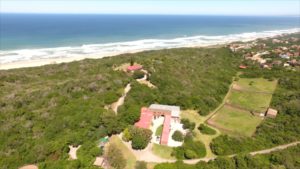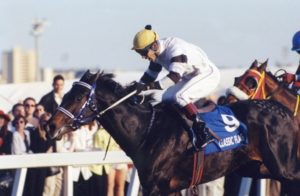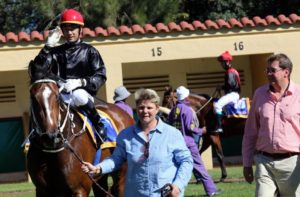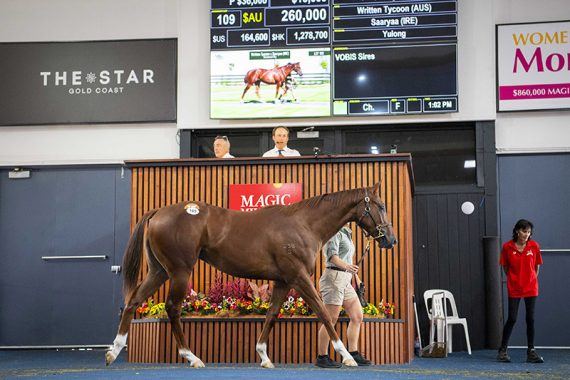Arne Botha is one third of the ‘Estate Late B H Botha & Arne J Botha & Mrs M E Botha’ listed as the breeders of 2017 Gr2 Dingaans winner, Monks Hood and as hearty and affable a character as you could wish to meet.
Benmarne Stud is situated on 400ha between PE and Jeffries Bay, with 2,5km of beach front. According to Arne, ‘the big business is horses’, but they also run a herd of Bonsmara cattle, and on the day I ring, he’s in the middle of dealing with an attempted stock theft. He asks to call me back once he’s completed all the necessary admin and duly does so an hour or so later. After commiserating agreeably about crime, the hazards of farming and the state of the nation in general, we turn to more fun conversation – his farm, his horses and the pride and joy which is Monks Hood.
Benmarne Stud
The family association with horses has faithfully been passed on and is now into the fourth generation. “My grandfather had horses and we’ve had horses that won the Gold Cup and the Chairmans.”
Benmarne is a small stud, that was a big stud, that was started by Arne’s father, the late Mr Ben Botha. “We bought the farm in 1985 and there wasn’t even a fence. It’s a family farm and it’s a great privilege to have had four generations of our family in horses. First my grandfather, then my father who died about a year and a half ago, now me, my wife and my children.
The name is ‘Ben’ (for my father) M (for my mother, Marie, who is still involved with the farm) and Arne for me. It was named before I got married and one day my wife (Elaine) asked but where’s her part in the name and my father said ‘see that ‘e’ on the end? That’s yours!’ I’m so grateful – otherwise I’d never live it down!”
Arne and his father both had an engineering background. He explains, “My father was an aeronautical engineer. In 1989 we opened our own business with underground mining equipment and did a lot of work for companies like Anglo, BHP Billiton, SASOL, etc. Then things changed and it got harder to run as a family business, so we eventually decided to sell everything and focus on the horses, so we moved to the farm permanently in 2007.”
“It’s been a lot of work, but it’s special to have four generations that have an interest in racing and all love it. We also have very good staff headed up by Michael Vosloo, who is ex Maine Chance and I’ve got a very good team of people with me.”
Racing
Arne relates that his first horse, Warrior King (Blazing Hooves – Royal Courier) was trained by Andy Smith. “We knew nothing about horses at the time. When we rang to ask if the horse had arrived, Andy said ‘Yes. Why did you send me this piece of ***?’ I didn’t like him immediately,” he chuckles. “I thought, ‘How can you say that, when we’ve sent the horse in with such a beautiful long mane? But he won me 5, that piece of ****! Gavin and I grew up together with horses. It was an interesting time. Then my father started buying, then he bet and won a double and won a lot of money. And like with any gambling, when you win, the bug bites and you want the keys!”
“You buy horses, then you end up with fillies and eventually we were sitting with 280. Unfortunately they weren’t all great quality,” he admits. Arne made work of downsizing in order to focus on quality and make a commercial go of the farm. “We reduced the horses to 30, of which around 10 are broodmares,” and that is the number they now work off. He also still has horses in training, mainly with Yvette Bremner in PE and Mr Ormond Ferraris in Johannesburg.
Classic Flag
Another special feature of the stud is their resident Rothmans July winner. Arne explains that they bought Classic Flag from Prof Herbst when he’d retired from racing, and stood him as a stallion. “He won 10 races, he won the July, he was 2nd and 4th in the July, he won the Dingaans – he was a fantastic animal. He’s a small animal, but he had the courage and the will.”
“Mr Ferraris came to visit and asked where he was and went down to see him. ‘Classic’ saw him from far away and came straight up to him and rested his head on him. Mr Ferraris said ‘I wish I could have another one like this.’”
He explains that Classic Flag has been stood down from stud duties. “We’ve totally retired him and he’s an old man now, but he can walk on the farm until his time comes. We still have a few of his foals, including Forest Digger who won 4 and then broke his knee. Everyone said we should shoot him, but I couldn’t. We put him in a stable for a year and after that year Manfred Rohwer came and did x-rays and he went back into training and won another four races. He’s also on the farm. People say to me, ‘But he’s retired, why do you keep him?’ He was good to me,’ he says simply. “He will also live here till his beard hangs on the ground.”
Feeling
“The breeding business is not easy. My father always said, the horses eat the steaks, we eat the grass,” he laughs. “We feed Epol. We had the agency for them in the Eastern Cape and our horses look fantastic. We have very few colics because of the food quality.”
“Horses are not like cattle – you get very attached to them. Each one has its own personality. You spend all that time and effort in raising them and then they go and do things like break their legs. It can be very hard. Last year, right at the back of the farm, we sighted a Cape cobra. It was about 3m long. We looked and looked, but couldn’t find it and two days later it bit one of my foals. If they get bitten by a puff adder, their face swells up, but you can put in a hose pipe to help them breathe until they recover, but Cobra venom attacks the heart and lungs. Half an hour later the foal was gone – there was nothing we could do,” he says sadly.
It is clear that the stud is more than just a business interest, there is real passion, emotion and hands on blood, sweat and tears that goes into producing and raising their horses.
“Think of everything that goes into it. The drive to have the mare covered, then making sure she’s in foal, then you wait for 11 months for the foal to be born and watch the mare and 9 times out of 10 they give birth in the middle of the night. Then you get there and the water’s broke and you get the foal out, or often they’re not positioned correctly, and you get them out and hope everything’s OK. You hold the placenta and feel how the blood pumps from the mare into the foal and within 20 minutes they’re standing up and starting to look for the udder. It’s an absolute miracle of nature. And then your foal grows up and gets bitten by a snake. It’s very difficult to experience.”
“You might pay a lot of money for an outside cover, or buy shares and then the foal is born with skew legs. On the other hand, you might get a fantastic foal, with fantastic bloodlines, but it isn’t blessed with the ability to run. Sometimes you have horses that aren’t accepted for a sale that you race yourself and end up winning 14 or 15 races. It’s a very difficult sport.”
Reflecting that with everything that can go wrong, it’s a miracle anyone perseveres, he agrees, but then concludes, “I think that’s why there’s no feeling like the Dingaans and why we feel so blessed to have horses like this. It’s something you cannot explain to anyone. I shouted myself half hoarse. I had hot and cold shivers – it was like being a woman with menopause!” he jokes. “It’s the most unbelievable feeling and that feeling is the same for the breeder, my staff were all running around shouting for everyone to come and watch, the trainer, the jockey, the owner, the whole lot. If you look at horse people – things may be difficult, but with something like this, everyone stands together because we love the horse. It’s about the horse, not us. That’s what makes it such a wonderful sport.”
Monks Hood
Amber Bouquet, the dam of Monks Hood, has had four foals to date including Monks Hood and all four are winners. “My father went to Adv Joubert’s dispersal sale and bought her in foal to Daylami. She produced Daylami Star who won. The following year we sent her back to Daylami, but the foal died in a paddock accident. I learnt a valuable lesson from that experience and now keep my mares with newborn foals separate from the group for two months. Then I’ll put the mare next door to the others and see how that goes and then only will I put them together.”
Arne has been diligent about following up on Monks Hood since he was sold. “There are two sides. I phoned Alistair and asked how is the horse. He was very open and said he thought it’s a very good horse. Other people, when you ring and ask, they might try and fob you off. Some people are of the view that they’ve bought the horse from you, so why do you want to know how good he is? People see things differently. So I’m very grateful that Alistair is prepared to share. Many don’t.”
“We’re also very lucky to have Mary as an owner. She gives her horses a chance and there’s no pressure from her side, but she does expect that when they run, they must be ready to give their best. That’s what makes her a good owner. You can’t push. They will tell you themselves when they’re ready. That’s very important.”
The stud have enjoyed remarkable success off their small base. “We’re very blessed to have good mares. We’ve bred a Gr1 winner (Querari Falcon) and now a Dingaans winner.”
Arne is sending a draft of four to the 2018 National Yearling Sales, including three Queraris. “One is a half sister to Querari Falcon and the other is a Full Brother to Monks Hood – and even more beautiful,” he says proudly. “Seriously, if you think Monks Hood is beautiful, you must come and see this one. We’ve also got a half brother by Pathfork and the mare has just been covered by Gimmethegreenlight. When we went to Varsfontein for the cover – and this was before the Dingaans – the Varsfontein guys took one look at our Pathfolk colt and said if the Gimme looks anything like that, it will be a champion.”
You’d need to go a long way to find someone with the Bothas’ passion and enthusiasm and it’s wonderful to see them being rewarded with success. We wish them all the very best for the future.











